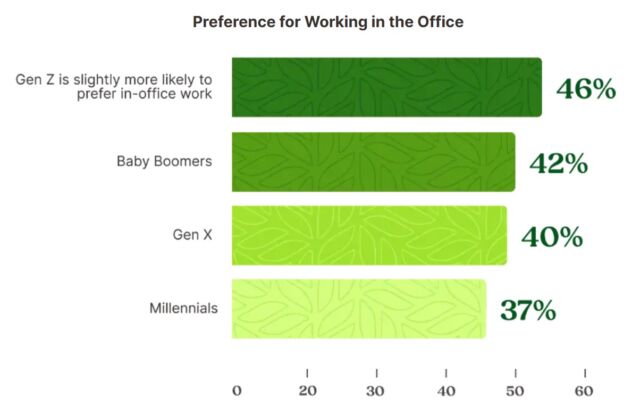Some company heads hoped return-to-office mandates would make people quit, survey says

Enlarge / RTO mandates can boost workers’ professional networks, but in-office employees may also spend more time socializing than remote ones.
A new survey suggests that some US companies implemented return-to-office (RTO) policies in the hopes of getting workers to quit. And despite the belief that such policies could boost productivity compared to letting employees work from home, the survey from HR software provider BambooHR points to remote and in-office employees spending an equal amount of time working.
BambooHR surveyed 1,504 full-time US employees, including 504 human resources (HR) workers who are a manager or higher, from March 9 to March 22. According to the firm, the sample group used for its report “The New Surveillance Era: Visibility Beats Productivity for RTO & Remote” is equally split across genders and includes “a spread of age groups, race groups, and geographies.” Method Research, the research arm of technology PR and marketing firm Method, prepared the survey, and data collection firm Rep Data distributed it.
Trying to make people quit
Among those surveyed, 52 percent said they prefer working remotely compared to 39 percent who prefer working in an office.

Enlarge / A generation-based breakdown of respondents who prefer remote work. BambooHR’s report didn’t specify how many respondents it surveyed from each category.
Despite an apparently large interest in remote work, numerous companies made workers return to the office after COVID-19 pandemic restrictions were lifted. The report suggests that in at least some cases, this was done to get workers to quit:
Nearly two in five (37 percent) managers, directors, and executives believe their organization enacted layoffs in the last year because fewer employees than they expected quit during their RTO. And their beliefs are well-founded: One in four (25 percent) VP and C-suite executives and one in five (18 percent) HR pros admit they hoped for some voluntary turnover during an RTO.
It’s hard to get a firm understanding of the effectiveness of RTO policies, as 22 percent of HR professionals surveyed said that their company has no metrics for measuring a successful RTO. The report points to a “disconnect between stated goals for RTO and actually measuring the success of those goals.”
The report also found that 28 percent of remote workers fear they will be laid off before those working in the office. While BambooHR’s report doesn’t comment on this, some firms have discouraged employees from working remotely. Dell, for example, told remote workers that they can’t be promoted.
“By using RTO mandates as a workforce reduction tactic, companies are losing talent and morale among their employees,” BambooHR’s report says. The report notes that 45 percent of people surveyed whose companies have RTO policies said they lost valued workers. The finding is similar to that of a May study of Apple, Microsoft, and SpaceX that suggested that RTO mandates drove senior talent away.
In BambooHR’s survey, 28 percent said they would consider leaving their jobs if their employer enacted an RTO mandate.
Productivity
A frequently cited reason for in-office mandates is to drive teamwork, collaboration, and productivity. BambooHR’s data, however, doesn’t support the idea of RTO mandates driving productivity.
According to the report, regardless of whether they’re working in their home or in an office, employees work for 76 percent of a 9-to-5 shift. The report adds:
When it comes to who’s more productive overall, in-office workers spend around one hour more socializing than their remote counterparts, while remote workers spend that time on work-related tasks and responsibilities.
Despite this, 32 percent of managers said that one of the main goals of their firm implementing an in-office policy was to track employee working habits, with some companies tracking VPN usage and company badge swipes to ensure employees are coming into the office as expected.
RTO works for some
Although the majority of people surveyed prefer working from home, the survey also highlighted some perceived benefits of working in the office. For example, 48 percent of the people surveyed said “their work results have improved” since returning to the office, per the report. And 58 percent said they have a “stronger professional network” since going back, BambooHR reported.
Preferences for working from home or in an office can vary by various factors, like age. This points to the benefits of building RTO strategies around worker feedback and needs.
“The mental and emotional burdens workers face today are real, and the companies who seek employee feedback with the intent to listen and improve are the ones who will win employee loyalty and ultimately customer satisfaction,” Anita Grantham, head of HR at BambooHR, said in a statement.
Some company heads hoped return-to-office mandates would make people quit, survey says Read More »









